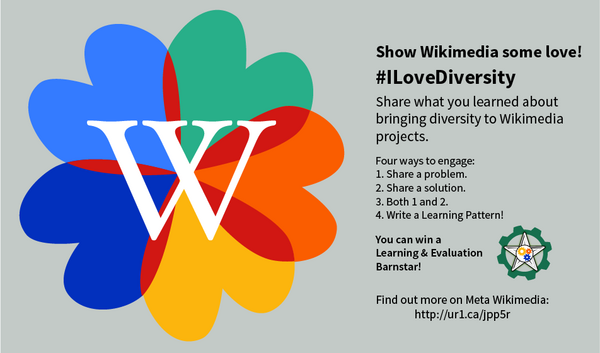Help close the gaps: share what you learned about bringing diversity to Wikimedia projects.
Image by María Cruz, free license under CC-BY-SA-4.0.
For many years, the Wikimedia movement has acknowledged that language, culture and gender diversity are vital for its goal to share the sum of all human knowledge. But we are still facing some challenges in supporting diversity across Wikimedia projects. For example, the Chinese, Hindi, and Arabic Wikipedias have very small percentages of editors, when compared to the total population of people who know those languages; only about a quarter of the world’s sovereign states participated in Wiki Loves Monuments 2014 on Wikimedia Commons; and only a minority of Wikipedia contributors are women. To address these gaps, several initiatives have been set to foster a better understanding of this problem, and also to increasing diversity in participation and content coverage, some of them being Writing Diversity back in Wikipedia toolkit and Charting diversity, to name only two. The Learning and Evaluation team now wants to capture the learnings that stem from these initiatives.
Diversity Campaign
How much do we know about diversity-oriented programs and projects? If you visit the Learning Pattern Library, you’ll see that little information is available about diversity practices and outcomes for Wikimedia programs or projects.
For example, few of these questions are answered in that library:
- Have you preserved your cultural history through Wikimedia photo contests and editing events?
- Have you worked to enrich a particular language or cultural group on Wikimedia?
- Have you studied diversity issues in online communities?
- What have you learned about encouraging diversity on Wikimedia?
Starting in March 2015, the WMF Grantmaking team will engage our communities in a new initiative: the 2015 Inspire Grants Campaign. This three-month event will sharpen the focus of Individual Engagement Grants and Project and Event Grants to support potential projects that can help close the gender gap. You can support this campaign in a variety of ways — even if you don’t need to apply for a grant. Share your questions and answers about diversity on Wikimedia projects, and help expand our knowledge of this topic.
Get involved
Share your experience and ideas by creating new learning patterns, to support diversity through Wikimedia projects and activities!
Is there anything you would like to know about gender diversity that has not yet been posted? Would you like to share something you learned from your own experience? Post your questions and answers in ‘Inspire Learning Patterns.’ There are multiple ways to participate:
- Describe a problem: share your challenges and the changes you would like to see.
- Offer a solution: there may be different ways to solve the same problem. Do you see a challenge you can relate to? What is your proposed solution?
- Describe a problem and offer a solution: show others how you tried to solve a specific challenge.
- Endorse other people’s contributions: if you think a problem and a solution are relevant, even if they are not linked, endorse them by signing below the edits.
- Create a Learning Pattern based on a Problem and Solution set: take a problem and solution set and create a learning pattern based on it.
You can contribute in any of these ways directly on the Diversity Learning Patterns campaign page!
If you have new information to share, feel free to start a Learning Pattern! You can do that on the Learning Pattern Library. Remember to add [[Category:Diversity learning patterns]] and help us to spread our knowledge. These will appear automatically on Diversity Learning Patterns campaign page.
If you would like to submit a proposal for Inspire Grants, use new templates to link relevant Learning Patterns in your proposals and reports!
Together with the Inspire Grants campaign, this joint effort can help develop new ideas for bridging our diversity gaps. We can all contribute something to make Wikimedia projects more diverse — whether it’s questions, answers, or ideas for projects, events and programs.
How would you like to contribute to this campaign?
María Cruz, WMF Evaluation Community Coordinator
Brett Gibbs, WMF Learning and Evaluation Intern
All photos in this article by María Cruz, freely licensed under CC-BY-SA-4.0.

Can you help us translate this article?
In order for this article to reach as many people as possible we would like your help. Can you translate this article to get the message out?
Start translation


